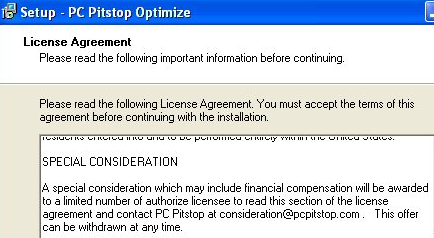You've probably agreed to dozens of End User License Agreements (EULA) in your life, but have you ever actually read any of them? Pretty much every piece of software and web service in existence requires you to accept the terms and conditions before you use them, but most people just scramble to click the I Accept button.
Many EULAs contain thousands of words of confusing legalese, which can at times hide crazy terms and conditions. Let's look at some funny EULAs from the past and present to see what zany clauses you've probably agreed to.
1. Amazon Lumberyard Comes Back to Life
Amazon Lumberyard is a free game engine. Anyone can use it to build or host a game; it integrates with Twitch streaming and Amazon's AWS cloud platform.
In section 57.10 of the AWS EULA, Amazon states that you should not use Lumberyard with critical systems like medical devices or nuclear facilities. But it makes one exception to this:
However, this restriction will not apply in the event of the occurrence (certified by the United States Centers for Disease Control or successor body) of a widespread viral infection transmitted via bites or contact with bodily fluids that causes human corpses to reanimate and seek to consume living human flesh, blood, brain or nerve tissue and is likely to result in the fall of organized civilization.
So if the zombie apocalypse ever happens, it's good to know that you won't face any legal repercussions for running your X-ray service on Amazon Lumberyard.
2. Don't Build Nuclear Weapons With iTunes
The iTunes EULA makes mention that nobody from US-embargoed countries or certain lists can use the software. However, a much more drastic clause closes out this section:
You also agree that you will not use these products for any purposes prohibited by United States law, including, without limitation, the development, design, manufacture, or production of nuclear, missile, or chemical or biological weapons.
At last, the long-time argument is settled: Apple expressly forbids you from using iTunes to create nuclear missiles. Make sure you don't accidentally activate the nuke function when you're cleaning up the iTunes interface.
3. Sold Your Soul? April Fools!
You might joke about having to "sell your soul" when you sign a contract. But for over 7,500 people who shopped at former UK video game store GameStation on April Fool's Day 2010, this was more literal than they thought.
On that day, GameStation updated its website terms and conditions with the following:
By placing an order via this Web site on the first day of the fourth month of the year 2010 Anno Domini, you agree to grant Us a non-transferable option to claim, for now and for ever more, your immortal soul. Should We wish to exercise this option, you agree to surrender your immortal soul, and any claim you may have on it, within 5 (five) working days of receiving written notification from gamesation.co.uk or one of its duly authorized minions.
We reserve the right to serve such notice in 6 (six) foot high letters of fire, however we can accept no liability for any loss or damage caused by such an act. If you a) do not believe you have an immortal soul, b) have already given it to another party, or c) do not wish to grant Us such a license, please click the link below to nullify this sub-clause and proceed with your transaction.
Unsurprisingly, just 12 percent of people clicked the link to nullify the contract. They received a coupon for their prudence, though the company had mercy and nullified their soul rights the next day.
4. Free Money for Wading Through a EULA
PC Pitstop, a computer maintenance tool, created perhaps one of the most well-known funny contract agreements of all time. In 2005, the company added the following "special consideration" clause to its EULA [sic]:
A special consideration which may include financial compensation will be awarded to a limited number of authorize licensee to read this section of the license agreement and contact PC Pitstop at consideration@pcpitstop.com. This offer can be withdrawn at any time.
As it turns out, it took four months and over 3,000 downloads of the software before someone wrote in about this. They were rewarded with a $1,000 prize. Does this inspire you to start digging for something similar in the software you use?
5. Far Cry Enforces Morality
Just like software, video game license agreements can be strange as well. If you decide to purchase Far Cry 3: Blood Dragon from Steam, you should be aware of this restriction in the game's EULA:
It is not permitted: [ . . . ] To use it contrary to morality or the laws in force,
What standard of morality does this go by? Some regard it as immoral to play an M-rated violent video game in the first place. Perhaps it would be "contrary to morality" to, say, use the box that the game comes in to hit someone. But this is a digital game, so even that doesn't apply.
Of course, this EULA is also buried under a link on the right side of the page that's extremely easy to miss. So we don't expect Steam to start a moral panic anytime soon.
6. Tumblr's Versatile Usernames
Tumblr's Community Guidelines page defines some behavior that's prohibited on the service. It, of course, contains the usual banned practices like spam, deception, and violent content.
One of the categories is Username/URL Abuse or Squatting. This makes sense on the surface, but reading the details raises more questions:
Tumblr's usernames/URLs are meant for the use and enjoyment of all of our users. Don't squat, hoard, amass, accumulate, accrue, stockpile, rack up, buy, trade, sell, launder, invest in, ingest, get drunk on, cyber with, grope, or jealously guard Tumblr usernames/URLs.
If you find a way to get drunk on a Tumblr username, please let us know. We'd love to see how that works.
7. Arbitration Clauses
If a company ever does you serious wrong, you'd probably consider pursuing legal action to make it right. However, nearly every EULA nowadays includes an arbitration clause. Essentially, this means that by using the service, you waive your right to sue or join a class-action lawsuit.
Should you want to make a case against the company, you'll have to settle it out of court. A third-party arbiter will hear both arguments and decide.
As you'd imagine, this doesn't bode well for the user. The company will almost certainly have a team of lawyers, while you'll be standing alone. Arbitration is also quite expensive, meaning most people probably won't bother to pursue it anyway.
Here's an example of how this sounds in Instagram's EULA:
ARBITRATION NOTICE: You agree that disputes between you and us will be resolved by binding, individual arbitration and you waive your right to participate in a class action lawsuit or class-wide arbitration. We explain some exceptions and how you can opt out of arbitration below.
Companies sometimes update their terms of service to include an arbitration clause. For example, in 2011, Sony's PlayStation Network went through an extended outage after it suffered a severe data breach that exposed over 70 million users' information. A class action lawsuit was organized against Sony due to the damage. Afterward, Sony updated its terms of service to prevent people from suing the company like this again.
Some organizations include a method of allowing you to opt out of arbitration. However, you typically must do so within a short time of creating your account and have to opt out by mail. As you'd expect, not many people know about this or bother to do it.
8. EULAs May Change at Any Time
As if all the above confusion wasn't enough, most EULAs reserve the right to change their contents at any time. This means that even if you take the time to read and understand the current EULA, it might change to something totally different in the future.
This excerpt from Hulu's EULA is just one instance of this:
We may need to make changes to these Terms from time to time for many reasons. [ . . . ] You should look at these Terms regularly [ . . . ] Any material change to these Terms will be effective automatically 30 days after the revised Terms are first posted or, for users who register or otherwise provide opt-in consent during this 30-day period, at the time of registration or consent, as applicable.
They all note that by continuing to use the service, you agree to the updated terms. We hope you periodically monitor the EULA for every service and software you use to make sure you still agree with everything!
Weird Terms and Conditions Abound
We've looked at just a few of the funny and wild EULA clauses in popular software. There are certainly more in the wild, but they're difficult to track down because nobody reads them.
While some of these are funny, others are worrying. Social media sites claim complete ownership of everything you post to them, and most services reserve the right to kick anyone off for any reason they see fit.
We're not legal experts, but the validity of these EULAs has been controversial. It seems doubtful that a judge would hold you to something in a so-called "clickwrap" license. Nevertheless, companies don't stop fitting as much insanity as they can into them.
For more laughs, have a look at the most ridiculous Windows errors of all time.



